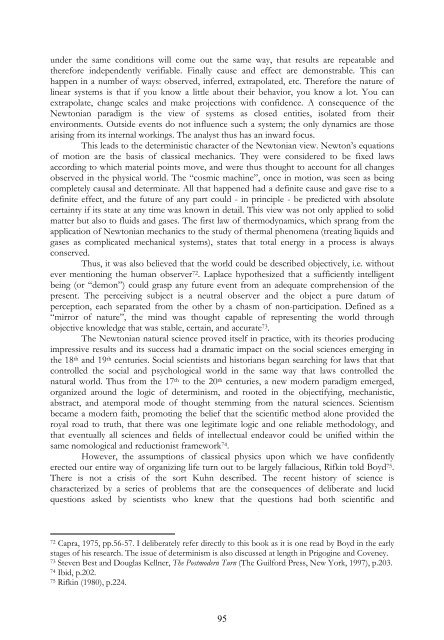Science, Strategy and War The Strategic Theory of ... - Boekje Pienter
Science, Strategy and War The Strategic Theory of ... - Boekje Pienter
Science, Strategy and War The Strategic Theory of ... - Boekje Pienter
You also want an ePaper? Increase the reach of your titles
YUMPU automatically turns print PDFs into web optimized ePapers that Google loves.
under the same conditions will come out the same way, that results are repeatable <strong>and</strong>therefore independently verifiable. Finally cause <strong>and</strong> effect are demonstrable. This canhappen in a number <strong>of</strong> ways: observed, inferred, extrapolated, etc. <strong>The</strong>refore the nature <strong>of</strong>linear systems is that if you know a little about their behavior, you know a lot. You canextrapolate, change scales <strong>and</strong> make projections with confidence. A consequence <strong>of</strong> theNewtonian paradigm is the view <strong>of</strong> systems as closed entities, isolated from theirenvironments. Outside events do not influence such a system; the only dynamics are thosearising from its internal workings. <strong>The</strong> analyst thus has an inward focus.This leads to the deterministic character <strong>of</strong> the Newtonian view. Newton’s equations<strong>of</strong> motion are the basis <strong>of</strong> classical mechanics. <strong>The</strong>y were considered to be fixed lawsaccording to which material points move, <strong>and</strong> were thus thought to account for all changesobserved in the physical world. <strong>The</strong> “cosmic machine”, once in motion, was seen as beingcompletely causal <strong>and</strong> determinate. All that happened had a definite cause <strong>and</strong> gave rise to adefinite effect, <strong>and</strong> the future <strong>of</strong> any part could - in principle - be predicted with absolutecertainty if its state at any time was known in detail. This view was not only applied to solidmatter but also to fluids <strong>and</strong> gases. <strong>The</strong> first law <strong>of</strong> thermodynamics, which sprang from theapplication <strong>of</strong> Newtonian mechanics to the study <strong>of</strong> thermal phenomena (treating liquids <strong>and</strong>gases as complicated mechanical systems), states that total energy in a process is alwaysconserved.Thus, it was also believed that the world could be described objectively, i.e. withoutever mentioning the human observer 72 . Laplace hypothesized that a sufficiently intelligentbeing (or “demon”) could grasp any future event from an adequate comprehension <strong>of</strong> thepresent. <strong>The</strong> perceiving subject is a neutral observer <strong>and</strong> the object a pure datum <strong>of</strong>perception, each separated from the other by a chasm <strong>of</strong> non-participation. Defined as a“mirror <strong>of</strong> nature”, the mind was thought capable <strong>of</strong> representing the world throughobjective knowledge that was stable, certain, <strong>and</strong> accurate 73 .<strong>The</strong> Newtonian natural science proved itself in practice, with its theories producingimpressive results <strong>and</strong> its success had a dramatic impact on the social sciences emerging inthe 18 th <strong>and</strong> 19 th centuries. Social scientists <strong>and</strong> historians began searching for laws that thatcontrolled the social <strong>and</strong> psychological world in the same way that laws controlled thenatural world. Thus from the 17 th to the 20 th centuries, a new modern paradigm emerged,organized around the logic <strong>of</strong> determinism, <strong>and</strong> rooted in the objectifying, mechanistic,abstract, <strong>and</strong> atemporal mode <strong>of</strong> thought stemming from the natural sciences. Scientismbecame a modern faith, promoting the belief that the scientific method alone provided theroyal road to truth, that there was one legitimate logic <strong>and</strong> one reliable methodology, <strong>and</strong>that eventually all sciences <strong>and</strong> fields <strong>of</strong> intellectual endeavor could be unified within thesame nomological <strong>and</strong> reductionist framework 74 .However, the assumptions <strong>of</strong> classical physics upon which we have confidentlyerected our entire way <strong>of</strong> organizing life turn out to be largely fallacious, Rifkin told Boyd 75 .<strong>The</strong>re is not a crisis <strong>of</strong> the sort Kuhn described. <strong>The</strong> recent history <strong>of</strong> science ischaracterized by a series <strong>of</strong> problems that are the consequences <strong>of</strong> deliberate <strong>and</strong> lucidquestions asked by scientists who knew that the questions had both scientific <strong>and</strong>72 Capra, 1975, pp.56-57. I deliberately refer directly to this book as it is one read by Boyd in the earlystages <strong>of</strong> his research. <strong>The</strong> issue <strong>of</strong> determinism is also discussed at length in Prigogine <strong>and</strong> Coveney.73 Steven Best <strong>and</strong> Douglas Kellner, <strong>The</strong> Postmodern Turn (<strong>The</strong> Guilford Press, New York, 1997), p.203.74 Ibid, p.202.75 Rifkin (1980), p.224.95
















